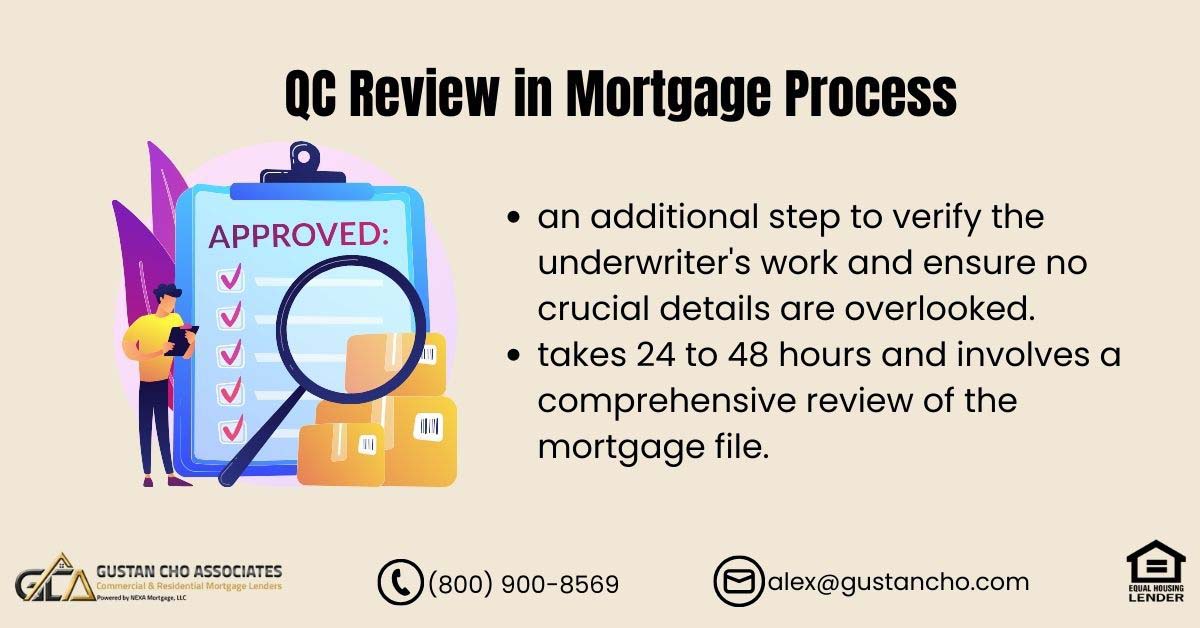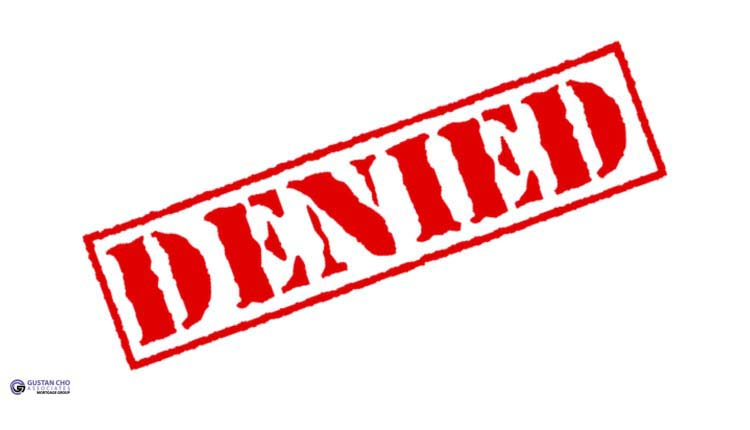In this blog, we will be covering the QC Review Prior Clear To Close During Mortgage Process by some mortgage lenders. The mortgage application and approval process starts when borrowers submit all of their financial and credit information to the mortgage lender. The mortgage process starts once the borrower is pre-approved and submits an executed real estate contract.
What role does the Mortgage Processor play in the mortgage loan application process?
In order to advance the mortgage loan application and prepare it for underwriting, the mortgage processor is responsible for requesting and assembling the required documents. Subsequently, the mortgage underwriter will issue a conditional approval for the mortgage loan. Once all conditions are met, the underwriter will provide a clear to close. However, in certain mortgage lending institutions, the underwriter may only issue a clear to close after the file undergoes a QC review prior clear to close stage. The QC review prior clear to close, serves as an additional step to verify that the original underwriter has not overlooked any details. Typically, this process is swift and does not take as much time as the initial mortgage underwriting process.
Get Help For Mortgage Loan Application Process, Click Here
Documents Required To Start The Mortgage Process
Information such as the following need to be processed by mortgage processors:
- two years tax returns
- two years W-2s
- two months bank statements
- signed mortgage application
- signed disclosures
- verification of rent or verification of mortgage
- verification of employment
- letters of explanations on credit inquiries or derogatory credit tradelines
- other forms required by lenders
First Step of the Mortgage Process
All documents get reviewed and crossed checked and processed by the assigned mortgage loan processor: Once the processor compiles the file and submits it to the lender’s underwriting department. The mortgage underwriter gets assigned to the file. The underwriter then underwrites the loan application. If everything is good, the underwriter will issue a conditional mortgage approval. Conditional loan approval will have conditions necessary for the underwriter to issue a clear to close.
What Is A Conditional Mortgage Loan Approval?
Mortgage Conditions can be things that need to be reviewed and checked off by underwriters in order for the issuance of clear to close. Examples of conditions are the following:
- title
- appraisal
- income verification
- IRS verification
- insurance information
- updated bank statements
- updated paycheck stubs
- updated verbal verification of employment
- other items that may need verification on what the mortgage loan applicant has listed on the mortgage application
Once borrowers submit all the conditions, the processor prepares the file for clear to close. Underwriter checks off all of the items received to see if they can issue a clear to close. Most mortgage companies will have the underwriter issue a clear to close. However, there are some lenders where the file that has been underwritten by a mortgage underwriter needs to go through the company’s Quality Control Desk prior for the original underwriter to be able to issue a CTC.
Contact For Conditional Mortgage Loans Aproval, Click Here
What is the Significance of a Clear to Close in the Mortgage Approval Process?
In the mortgage approval process, the primary objective is achieving a clear to close. This indicates that the lender is prepared to generate documents and fund the loan. Various lenders follow different policies in granting a clear to close. While some lenders permit mortgage underwriters to issue it upon approval of all conditions, others have a QC Review process that follows the initial clearance of conditions by the original underwriter.
What does it mean when there is a QC Review Prior Clear To Close in the mortgage process?
Not all mortgage companies incorporate a distinct Quality Control Underwriting Process. A QC review prior clear to close occurs when an additional mortgage underwriter evaluates the file, essentially scrutinizing the original mortgage underwriter’s work. Underwriters ensure the accuracy of everything verified by the initial underwriter and confirm that all conditions are in order—a sort of second pair of eyes. Once the QC review prior clear to close receives approval, the lender can proceed to authorize the closing department to prepare documents and schedule the home closing. Nevertheless, after the mortgage loan underwriter declares the mortgage loan application clear to close, it undergoes assessment by a QC review prior clear to close underwriter.
Role Of The QC Review Mortgage Underwriter
Depending on the mortgage lender, a QC Review Underwriter is often a different underwriter that cross-checks the original underwriter’s work: The QC underwriter goes through everything the original mortgage underwriter has done to see that there are no errors. The QC review underwriter often times will run a soft credit check pull to make sure borrowers have not incurred any additional debt. Also makes sure there are no fraud alerts issued. Once QC review underwriter signs off on the QC review, it goes back to the original mortgage underwriter for them to sign off on a clear to close. The QC review process normally takes 24 to 48 hours.
QC Review Prior Clear To Close?
Is it necessary for mortgage lenders to conduct QC Review Prior Clear To Close? The QC underwriting review represents the conclusive step performed by lenders before dispatching mortgage documents and initiating wire transfers to the title company. Not all lenders incorporate a QC review prior clear to close into their processes.
What prompts the need for a QC underwriting review when mortgage underwriting has thoroughly assessed borrowers and granted the clear to close?
In some cases, a QC review prior clear to close may involve a senior underwriting manager endorsing a mortgage underwriter’s file just before the clear to close. On the other hand, certain lenders opt to completely re-underwrite the entire file through a separate underwriting department. The subsequent paragraphs will delve into the details of QC Underwriting Review following mortgage approval but prior to the clear to close.
Speak With Us For Get Best Mortgage Lender For Your Mortgage Loans
Why Lenders Require a QC Review Prior Clear To Close?
Throughout my experience in various mortgage companies, I’ve observed that most lenders lack a dedicated QC underwriting review department. When such a department exists, it typically involves a second underwriter reviewing the initial mortgage underwriting to ensure no crucial details were overlooked. On the other hand, some lenders opt for a comprehensive mortgage underwriting process, which might extend beyond a week. We will be discussing the QC review prior clear to close by lenders that do have such a process during their mortgage process:
- QC underwriting review is Quality Control underwriting review
- The QC Review process normally only takes 24 to 48 hours
- A Quality Control mortgage underwriter will review the whole mortgage loan file that was underwritten by the original underwriter
- QC Review Underwriter’s role is to make sure there are no errors made
- Their role is also to make sure that the mortgage loan will be sellable on the secondary market after the mortgage lender funds the loan
- The QC Review Department will contract with a third party search company like Lexis Nexus or Data Verify to do a nationwide search on the borrower
- The third-party search company will do an extensive public search to see if they can discover any public records that have not been disclosed by borrowers and/or that is not reporting on the credit report
Depending on the lender, they will do a QC review prior clear to close or right after a clear to close has been issued.
When is the QC Underwriting Review typically conducted to issue a Clear to Close, and how does it impact the mortgage loan approval process?
QC review prior clear to close depends on the mortgage lender. Some lenders will do a QC review prior clear to close. Other lenders will issue a clear to close and the QC underwriting review will be done prior to funding.
A clear to close is when a mortgage underwriter has cleared all the conditions from the conditional mortgage loan approval. The underwriter gives the green light to fund the mortgage loan. If the QC underwriting review is done after the clear to close, then if Quality Control finds something wrong with the file with the third party search, the clear to close will be on hold until the issue or issues are cleared up.
Some common issues that are caught during QC review prior clear to close are when public records such as judgments show up by third-party searches where the judgments or other public records did not report on the borrower’s credit report.
QC Review Prior Clear To Close: Loan Denial After Clear To Close
There are cases where there is a mortgage loan denial after a clear to close has been issued: This is because Quality Control finds potential fraudulent issues with the mortgage loan application. With the company that I work for, Quality Control takes over after the mortgage underwriter issues a clear to close. Normally most of our clear to close files move on to closing and funding and we have no issues. However, there are some cases where QC may find issues that were either overlooked by the mortgage underwriter or items and factors that were not disclosed by the loan applicant and/or items that were not picked up on the credit report. Let’s look at a case scenario where a clear to close can get revoked.
Click Here For Talk To Us About Your Mortgage Loans
QC Review Prior Clear To Close On Discovery From Third-Party National Public Records Search
Suppose a mortgage borrower underwent credit repair, removing derogatory credit items such as collection accounts, charge-off accounts, judgments, tax liens, student loans, bankruptcies, and multiple foreclosures. On the 1003 mortgage application, the applicant indicated NO to questions about filing bankruptcy, having foreclosures, outstanding judgments, and being a party to a lawsuit. This response reflected the successful removal of derogatory items by the credit repair consultant hired by the borrower, and the mortgage originator, processor, and underwriter didn’t find any concerns, as these items were no longer reported on the credit bureaus. The underwriter, making decisions based on the borrower’s income, assets, liabilities, credit scores, and credit history from the credit reports, issued a clear-to-close, seemingly unaffected by the applicant’s affirmative responses on the questionnaire. The key question is whether the QC review occurred before the clear-to-close decision, considering the credit items’ removal through a third-party national public records search.
How long does the Quality Control Underwriting Review take before receiving clearance to close?
Before the closing and funding of the mortgage loan, the file undergoes a final review by the Quality Control Underwriting Review Department. This department conducts third-party national searches using vendors like Lexis Nexis and/or Data Verify to perform a national public records search.
If the borrower has multiple bankruptcies, foreclosures, judgments, and tax liens, these will be revealed by the third-party vendor. It’s important to note that public records deleted from the borrower’s credit report still exist in the public records.
Unlike derogatory credit items such as collection accounts and charge-offs, which can be deleted and remain undisclosed to third-party companies, public records like bankruptcies, foreclosures, short sales, judgments, tax liens, child support, alimony, and others persist. Mortgage lenders will discover these records, so it’s advisable to disclose all public records at the start of the mortgage process. The Quality Control Division of the mortgage company will undoubtedly uncover them before closing and funding the mortgage loan.
In Conclusion
Again, not all lenders have a separate QC review prior clear to close process. There are instances where the QC review process takes longer than 48 hours and can delay the mortgage closing. Borrowers who are getting the run around with a lender due to their QC Review and cannot get a clear to close can contact us at Gustan Cho Associates at 800-900-8569 or text us for a faster response. Or email us at alex@gustancho.com. Gustan Cho Associates has no lender overlays on government and conventional loans and has no QC Review.
We are available 7 days a week, evenings, weekends, and holidays.
FAQs: QC Review Prior Clear To Close During Mortgage Process
- What is the role of the Mortgage Processor in the mortgage loan application process? The Mortgage Processor is responsible for requesting and assembling the required documents to advance the mortgage loan application and prepare it for underwriting. They ensure all necessary paperwork is completed and submitted for review.
- What documents are required to start the mortgage process? Documents such as two years of tax returns, W-2s, two months of bank statements, signed mortgage applications, disclosures, verification of rent/mortgage, employment, and letters of explanation for credit inquiries are typically needed.
- What is a Conditional Mortgage Loan Approval? A Conditional Mortgage Loan Approval is issued by the underwriter and outlines conditions that need to be met before a Clear to Close (CTC) can be issued. Conditions may include title checks, appraisals, income verification, and updated financial documentation.
- What does receiving a Clear to Close mean in the mortgage approval process? A Clear to Close signifies that the lender is ready to finalize the loan and release funds. It indicates that all necessary conditions have been met, and the mortgage is ready for closing.
- What is a QC Review Prior Clear To Close in the mortgage process? A QC Review Prior Clear To Close involves an additional review by a Quality Control (QC) Underwriter before issuing a Clear to Close. This step ensures that all details have been accurately verified and confirms the readiness of the loan for closing.
- Is a QC Review Prior Clear To Close necessary for all mortgage lenders? Not all mortgage lenders incorporate a QC Review Prior Clear To Close into their processes. Some may rely solely on initial underwriting, while others implement this additional step for quality control.
- When is the QC Underwriting Review typically conducted, and how does it impact the mortgage loan approval process? The timing of the QC Underwriting Review varies by lender. It may occur before or after issuing a Clear to Close. This review thoroughly scrutinizes the mortgage file to prevent issues that could arise post-closing.
- How long does the Quality Control Underwriting Review take? The QC Review process typically lasts 24 to 48 hours, which may vary depending on the lender’s procedures and workload. Delays in this review could potentially prolong the mortgage closing process.
- What happens if issues are discovered during the QC Review Prior Clear To Close? If issues are identified during the QC Review Prior Clear To Close could delay or even result in the denial of the loan after a Clear to Close has been issued. Borrowers must disclose all relevant information upfront to avoid complications during this review.
- How can borrowers address concerns or delays related to QC Review Prior Clear To Close? Borrowers experiencing issues or delays due to QC Review can seek assistance from mortgage professionals who offer streamlined processes without extensive QC reviews. Contacting mortgage specialists like Gustan Cho Associates can provide solutions for smoother loan processing.
This blog about QC Review Prior Clear To Close During Mortgage Process was updated on January 29th, 2024.











if I’m already in a contract with a broker and signed off on docs with the lender but they are not performing timely on my loan, can I switch lenders mid stream?
Yes, you can change lenders during the mortgage process. Please email us with your contact information at gcho@gustancho.com or call us at 262-716-8151 or text us for a faster response. We are available 7 days a week, evenings, weekends, and holidays. Looking forward to working with you and your family.
Federal tax lien was placed on our home which I just found out about. Looking to get a cash out or equity loan to pay down the lien. Current equity in the home is around 250-300k.